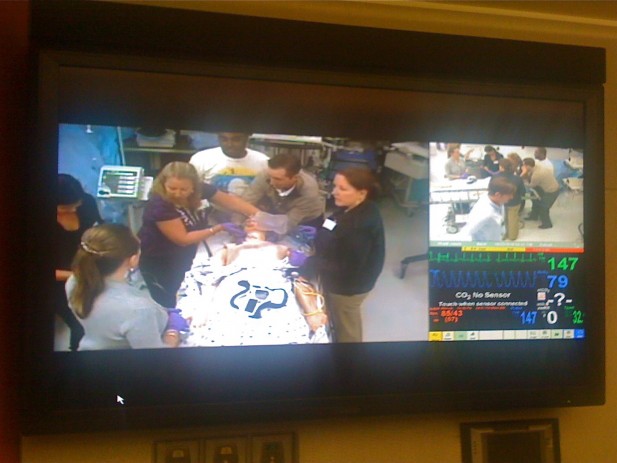The Sadie Elizabeth Abell Endowment for Pediatric Critical Care Simulation Training
In 1999, Institute of Medicine published “To Err is Human-Building a Safer System” and raised public awareness about patient safety. It estimated from 45,000 to 98,000 patients die every year from medical error, and it called for a safer medical system. One of the ways that patient safety can be greatly improved is through training of health care workers using simulation. We now have simulation mannequins to train with that breath, have a pulse, etc such that training is very similar to ‘real-life.’
Simulation training has been used in many high-risk industries for many years, probably most notably in aviation. Simulation can be used to both teach and evaluate book knowledge, technical skills and team management in crisis situations to ensure patient safety and the highest quality of care.
The Johns Hopkins Medicine Simulation Center’s mission is in fact to teach students and trainees better diagnostic and communication skills and for these participants to learn and practice procedures “on plastic” before performing procedures on patients, ideally enhancing both the educational experience AND patient safety.
All of these skills are especially needed in a Pediatric Intensive Care Unit (PICU), which is a complex environment with many hazards for potential medical errors due to the severity of illness of the children and the complexity of medical care required. Pediatric intensivists can minimize such problems in their role as leader of the intensive care team, but they need to be trained effectively not only to perform technical tasks, but also to be effective leaders. High-fidelity medical simulation can be an effective tool for all of these skills.
In order to ensure that pediatric intensivists complete their training with a complete set of both technical and behavioral skills, we have developed a novel simulation-based training program for pediatric critical care fellows. In this program, they will learn advanced techniques for managing the most critically ill children, such as instituting ECMO, a heart-lung bypass machine. Participants will also learn behavioral techniques such as leadership and communication with families. We are grateful that Sadie’s parents will help us teach these fellows about compassion and delivering difficult news to a family of a critically ill child. There is no better ‘teacher’ for this discussion than a family that has gone through this difficult time.
This novel program honors Sadie Elizabeth Abell, as well as all of the other critically ill children that will be benefited by this training.
Kristen Nelson McMillan, MD
Assistant Professor, Pediatric Critical Care
Department of Anesthesiology and Critical Care Medicine
HOPE Director
Johns Hopkins School of Medicine

